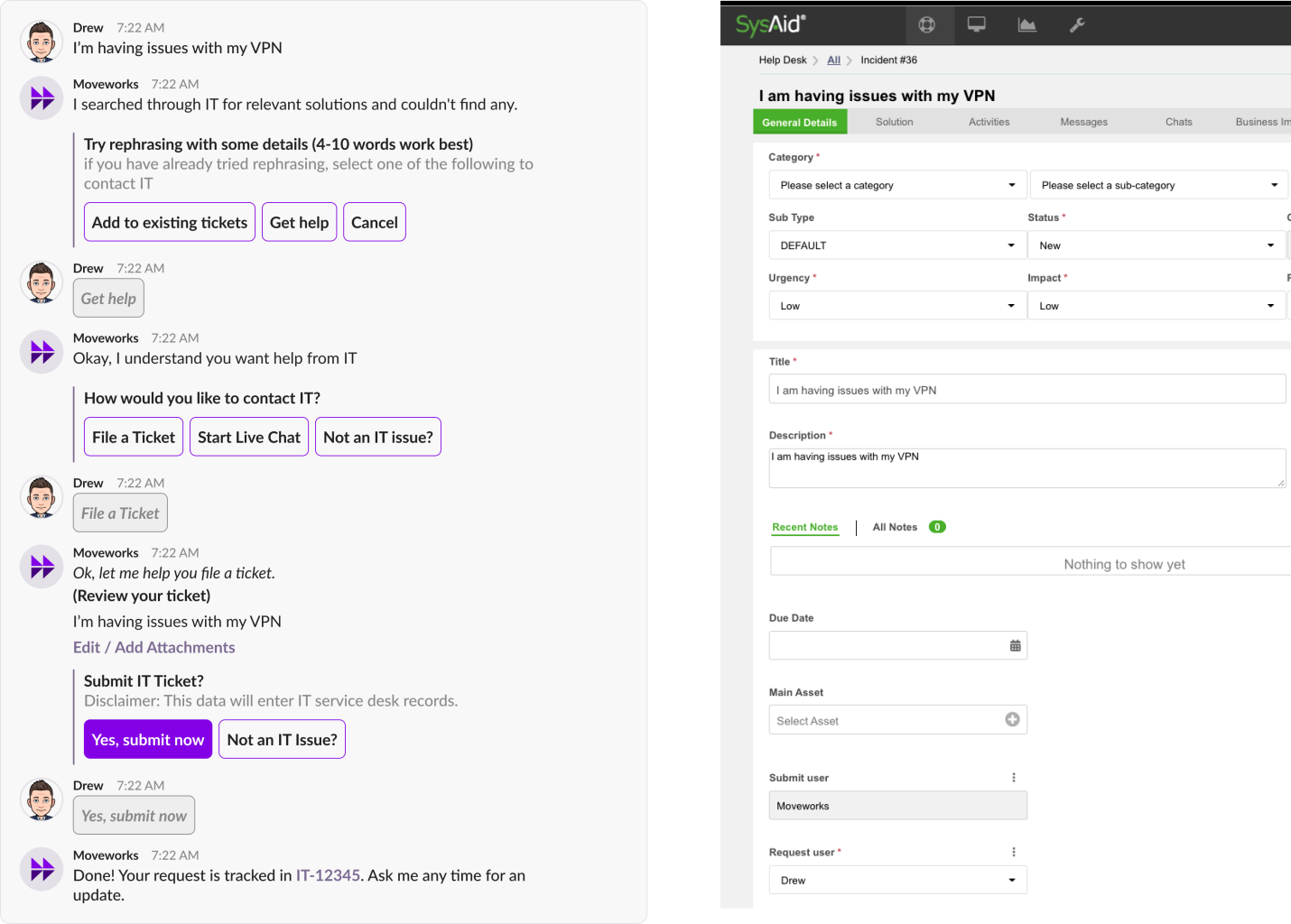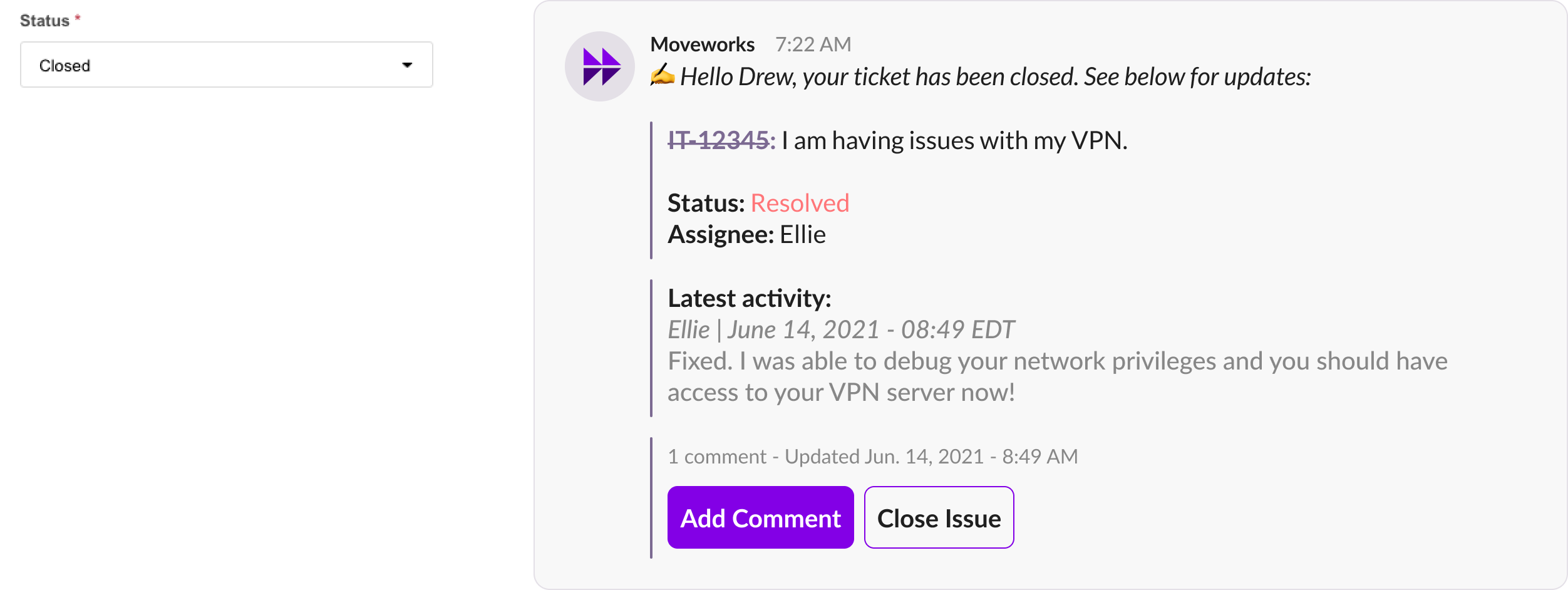Sysaid Ticketing Integration Overview
File Tickets

End-employee chat experience & respective Sysaid portal update (automated)
Behind the scenes
When the employee wants help with an issue that doesn’t ticket, Moveworks will provide the user utterance as the title and description.
curl --location --request POST '{{base_url}}/api/v1/sr' \
--header 'Authorization: Basic {{auto-generated-token}}' \
--header 'Cookie: JSESSIONID={{auto-generated cookie}} \
--data-raw '{
"info": [
{
"key":"title", "value": "I'm having issues with my VPN"
},
{
"key":"request_user", "value": "{{requestor_id}}"
},
{
"key":"description", "value": "I am having issues with my VPN"
}
]
}'Optionally, the end-employees can choose to provide more details to the ticket & attachments, those will be served via the description and attachment fields in the API.
Ticket Notifications
Your users will also receive ticket notifications when:
Comment added to a ticket

Sysaid portal work note added & respective end-employee notification (automated)
Ticket is closed

Ticket closed in Sysaid portal & respective end-employee notification (automated)
Ticket Nudges
Ticket Nudge works to ensure that tickets are not lost in the shuffle by checking for ticket updates every 10 seconds. They are delivered when:
• Ticket state is New or In Progress &
• Ticket has had no employee-facing comments for 3 days

Example end-employee notification nudge
View Tickets
Employees can check status of their tickets in real-time. We support the following query patterns:
-
View List of Tickets by Check Status
-
View Ticket by Subject Matter

curl --location --request GET '{{base_url}}/api/v1/sr?request_user={{user_id}}' \ --header 'Authorization: Basic {{auto-generated-token}}' \ --header 'Cookie: JSESSIONID={{auto-generated cookie}}' -
View Ticket by Ticket Number

curl --location --request GET '{{base_url}}/api/v1/sr/{{ticket_id}}' \ --header 'Authorization: Basic {{auto-generated-token}}' \ --header 'Cookie: JSESSIONID={{auto-generated cookie}}'
Add comments to tickets

End-employee chat experience & respective Sysaid portal update (automated)
Behind the scenes
When the employee adds comment to a ticket, we will pass it as a note and set the status of the ticket to Open.
curl --location --request PUT '{{base_url}}/api/v1/sr/{{ticket_id}}' \
--header 'Authorization: Basic {{auto-generated-token}}' \
--header 'Cookie: JSESSIONID={{auto-generated cookie}} \
--data-raw '{
"id": "12345",
"info": [
{
"key":"notes", "value": [
{
"userName": "{{user_name}}",
"createDate": 1657304389000,
"text": "Hey I need help with my laptop."
}
]
},
{
"key": "status", "value": "1"
}
]
}'Close Tickets

End-employee chat experience & respective Sysaid portal update (automated)
Behind the scenes
When the employee closes a ticket, we will call the /close endpoint that sets the ticket status to closed & provide a default solution into the ticket.
curl --location --request PUT '{{base_url}}/api/v1/sr/{{ticket_id}}/close' \
--header 'Authorization: Basic {{auto-generated-token}' \
--header 'Cookie: JSESSIONID={{auto-generated cookie}} \
--data-raw '{
"solution": "Was able to fix the VPN issue by providing the required privileges to the user."
}'Reopen Tickets
When the employee asks to re-open their ticket, they can always do so (whether the state is Closed - Verified or just Closed), Moveworks will set the ticket status to Reopened by End User to reopen it.

curl --location --request PUT 'https://moveworks.sysaidit.com/api/v1/sr/{{ticket_id}}' \
--header 'Authorization: Basic {{auto-generated-token}' \
--header 'Cookie: JSESSIONID={{auto-generated cookie}} \
--data-raw '{
"id": "{{ticket_id}}",
"info": [
{
"key": "status", "value": "8"
}
]
}'Updated 9 months ago